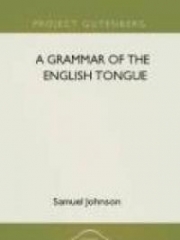Oblique. Thee, You.
You is commonly used in modern writers for ye, particularly in the language of ceremony, where the second person plural is used for the second person singular, You are my friend.
Singular. Plural.
Nom. He, They, Applied to masculines.
Oblique. Him, Them.
Nom. She, They, Applied to feminines.
Oblique. Her, Them.
Nom. It, They, Applied to neuters or things.
Oblique. Its, Them.
For it the practice of ancient writers was to use he, and for its, his.
The possessive p.r.o.nouns, like other adjectives, are without cases or change of termination.
The possessive of the first person is my, mine, our, ours; of the second, thy, thine, your, yours; of the third, from he, his; from she, her, and hers; and in the plural, their, theirs, for both s.e.xes.
Ours, yours, hers, theirs, are used when the substantive preceding is separated by a verb, as These are our books. These books are ours. Your children excel ours in stature, but ours surpa.s.s yours in learning.
Ours, yours, hers, theirs, notwithstanding their seeming plural termination, are applied equally to singular and plural substantives, as, This book is ours. These books are ours.
Mine and thine were formerly used before a vowel, as mine amiable lady: which though now disused in prose, might be still properly continued in poetry: they are used as ours and yours, when they are referred to a substantive preceding, as thy house is larger than mine, but my garden is more s.p.a.cious than thine.
Their and theirs are the possessives likewise of they, when they is the plural of it, and are therefore applied to things.
p.r.o.nouns relative are, who, which, what, whether, whosoever, whatsoever.
Nom. Who.
Gen. Whose.
Other oblique cases. Whom.
Nom. Which.
Gen. Of which, or whose.
Other oblique cases. Which.
Who is now used in relation to persons, and which in relation to things; but they were anciently confounded. At least it was common to say, the man which, though I remember no example of the thing who.
Whose is rather the poetical than regular genitive of which.
The fruit Of that forbidden tree, whose mortal taste Brought death into the world. Milton.
Whether is only used in the nominative and accusative cases; and has no plural, being applied only to one of a number, commonly to one of two, as Whether of these is left I know not. Whether shall I choose? It is now almost obsolete.
What, whether relative or interrogative, is without variation.
Whosoever, whatsoever, being compounded of who or what, and soever, follow the rule of their primitives.
Singular. Plural.
This These
In all cases. That Those.
Other, Others.
Whether.
The plural others is not used but when it is referred to a substantive preceding, as I have sent other horses. I have not sent the same horses, but others.
Another, being only an other, has no plural.
Here, there, and where, joined with certain particles, have a relative and p.r.o.nominal use. Hereof, herein, hereby, hereafter, herewith, thereof, therein, thereby, thereupon, therewith, whereof, wherein, whereby, whereupon, wherewith, which signify, of this, in this, &c. of that, in that, &c. of which, in which, &c.
Therefore and wherefore, which are properly there for and where for, for that, for which, are now reckoned conjunctions, and continued in use. The rest seem to be pa.s.sing by degrees into neglect, though proper, useful, and a.n.a.logous. They are referred both to singular and plural antecedents.
There are two more words used only in conjunction with p.r.o.nouns, own and self.
Own is added to possessives, both singular and plural, as my own hand, our own house. It is emphatical, and implies a silent contrariety, or opposition; as, I live in my own house, that is, not in a hired house. This I did with my own hand, that is, without help or not by proxy.
Self is added to possessives, as myself, yourselves; and sometimes to personal p.r.o.nouns, as himself, itself, themselves. It then, like own, expresses emphasis and opposition, as I did this myself, that is, not another; or it forms a reciprocal p.r.o.noun, as We hurt ourselves by vain rage.
Himself, itself, themselves, are supposed by Wallis to be put by corruption, for his self, it self, their selves; so that self is always a substantive. This seems justly observed, for we say, He came himself; Himself shall do this; where himself cannot be an accusative.
Of the VERB.
English verbs are active, as I love; or neuter, as I languish. The neuters are formed like the actives.
Most verbs signifying action may likewise signify condition or habit, and become neuters; as I love, I am in love; I strike, I am now striking.
Verbs have only two tenses inflected in their terminations, the present, and simple preterit; the other tenses are compounded of the auxiliary verbs, have, shall, will, let, may, can, and the infinitive of the active or neuter verb.
The pa.s.sive voice is formed by joining the participle preterit to the substantive verb, as I am loved.
To have. Indicative Mood.
Present Tense.
 A Grammar of the English Tongue
A Grammar of the English Tongue